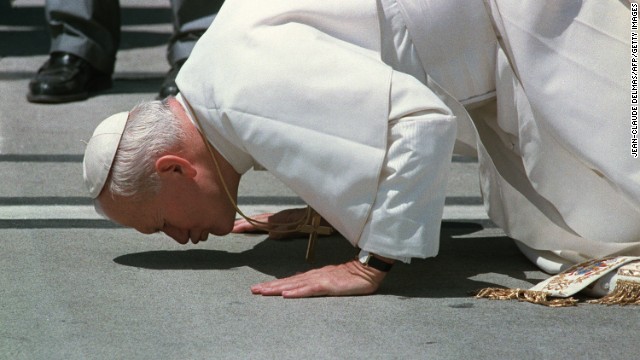Few outside the Roman Catholic hierarchy had heard of Karol Wojtyła before he became Pope in 1978. An obscure Polish bishop from humble roots, he appeared on the world stage out of nowhere, becoming the first non-Italian to hold the office in half a millennium. Within a few years, Pope John Paul II would have made an extraordinary impact, both on the Church he led and on the course of European history. In terms of popularity and global recognition, he became the first rock ’n’ roll pontiff.

His life story was 20th-century Europe in microcosm. Born in the aftermath of World War 1, he was caught in the vicious undercurrent of events. Forced into slave labour by the Nazis when they occupied his homeland, he later, as a priest and bishop, had to serve God in a totalitarian Communist state. Even after his election as Pope he was vulnerable to the vagaries of history, narrowly surviving an assassination attempt believed by some to have been ordered by the KGB.
John Paul was a force of nature, who went on to break many papal records. He reigned for more than twenty-six years, the third longest pontificate in history. He made 104 foreign visits taking in 129 countries, personally touching the lives of millions. He created 482 saints, more than all his predecessors put together. These record-breaking statistics are part of his legacy, but they pale into insignificance beside his most enduring achievement. In his willingness to confront state oppression in Poland and elsewhere, and in the consistency of his message that the rights of the individual must never be sacrificed to those of the State, he became one of the most important global figures of the late twentieth century.
One of the most revered popes in history, yes, as his forthcoming canonisation shows. Yet he is also one of the most loathed. Progressive Catholics and secular liberals bemoaned his refusal to allow artificial birth control or to reconsider the church’s position on priestly celibacy and the ordination of women. He rejected arguments that Catholics in AIDS-ravaged parts of the world, particularly Africa, should be allowed to wear condoms – an absolutist position that condemned many thousands of Catholics to death. Far from opening up the papacy to a conversation with the wider world, he shut down debate, stifled dissent and demanded unquestioning loyalty and obedience. For that reason, he left the Church weakened, divided and deeply unpopular with many of its own members.
Nearly a decade after his death, John Paul remains an enduringly fascinating figure – not despite but because of the strength of feeling he inspires both among his legions of admirers and his armies of critics. A man of contradictions, a globetrotting superstar, democrat and autocrat, hero and villain.
Hugh Costello is the author of pocket GIANTS Pope John Paul II and an Emmy-nominated screenwriter. He has written many dramas for BBC Radio, including Conclave, about the election of Pope John Paul II, and The Guest of St Peter’s, about the resignation of Pope Benedict XVI. He has written and edited for many national newspapers and magazines, including BBC History Magazine, the Sunday Times, the Daily Mail and Radio Times.
